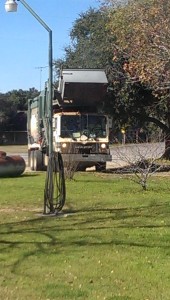OPERATIONAL TIPS
Each septic system is engineered and installed to handle typical domestic wastewater. Most systems will do this very effectively, provided they are operated and maintained properly. Homeowners, or system owners, are the operators of the system, and the service provider maintains the system for them. Similar to you operating your car and a mechanic servicing it for you. If you operate your car moderately, on a routine basis, you will get good performance and longevity from it and avoid costly repairs. Your septic system performance and longevity depends on you operating it moderately, on a routine basis. Below is a summary guideline of “do’s and don’ts” that most proprietary manufacturer’s have listed in their homeowners manuals. These guidelines apply to all types of septic systems, not just the advanced systems.
Things NOT to allow to be introduced or disposed of in your septic system include:
Plastic or cloth materials Paper towels, kleenex, and quilted toilet paper
Tobacco products and cigarette stubs All feminine hygiene and birth control products
Excessive cleaning materials Excessive fats and greases
All garbage disposal waste/ food waste Rainwater from gutters or storm drains
Water softener backwash (brine water) A/c or ice machine condensate discharge
Automatic toilet disinfection products Excessive drain cleaners (use a steel snake)
Back to back loads of laundry Excessive bleach (in laundry or cleaning)
Fabric softeners (use a drier sheet instead) Baby or cleaning wipes
Floor wax/ cleaners or rug cleaners Harsh chemicals
Septic tank additives (these will generally do more harm than good)
Petroleum products (grease, gasoline or any type of paint)
Generally speaking, if it hasn’t been ingested first, then it should not be disposed of in your system. This is with the exception of moderate amounts of toilet tissue, mild detergents, and house hold cleaners (read and follow label directions carefully).
Things that homeowners can DO to insure their system functions properly:
Keep an eye out for leaky faucets and fixtures (especially toilets, put some food coloring in the tank, if it shows up in the bowl there is a bad flapper);
Use trash can when preparing meals, and cleaning up from meals;
Collect cooking grease in an old sealable jar, or can, and dispose of it with your trash.
Keep screen strainers in the sink and showers, this will catch food particles and hair;
Use only moderate amounts of good quality house hold cleaning products;
Use only moderate amounts of toilet tissue (not quilted);
Keep an eye on your system. Periodically check for surfacing water around tanks and in disposal area. Notice that the aeration pump is running and test the alarm switch, if applicable.
Keep a healthy grass cover in the disposal area, and keep it trimmed to insure adequate evaporation and transpiration;
Keep power turned on to the system at all times (If it has wires, it needs power 24/7);
Keep children, pets, and livestock away from tanks and out of disposal area;
Keep pest (such as fire ants) away from electrical components ( air pumps and controls);
Practice good water conservation (turn off water while brushing teeth, shaving, etc.)
Use qualified, licensed professionals to make any repairs or for routine service;
Have tanks pumped, cleaned, and refilled with clean fresh water to normal operating level periodically;
Talk to a professional and educate yourself on the type of system you own;
The ideas above are a compilation of guidelines from different manufacturers and on site professionals. There is no letter, per say, to this law. In fact, it is not even law, as we think of it. It is Mother Natures Law. The people who own, operate and live on septic systems must have a little different life style than people who live in the city, or in municipal districts. Whether it is a gravity fed conventional or a very complex nonstandard system, the ideas are the same. Good education, water conservation, and common sense can insure good performance and longevity of your system. Should you have a question, ask some one. Should you have a problem, call some one. Preferably a professional who will steer you in the right direction.

